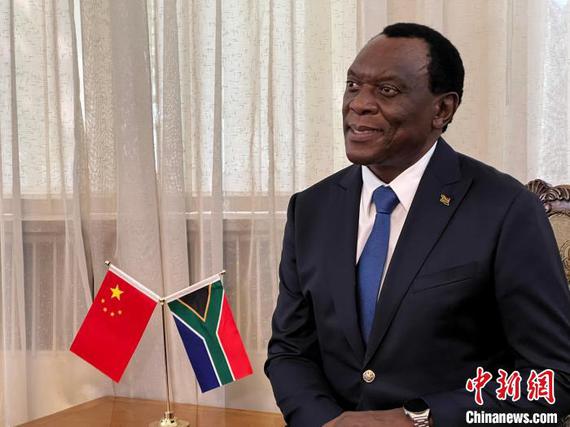I want to share two Chinese features with my people: South African Ambassador to China
"Chinese culture, and Chinese people's hard work are the two features that I want to share with South Africans,” said Siyabonga Cwele, the South African Ambassador to China, in an exclusive interview with China News Service in Beijing.
Cwele has served as the Ambassador to China for more than three years and visited Zhejiang, Hubei, Hunan, Guizhou provinces, as well as Chongqing Municipality, etc.

Siyabonga Cwele, the South African Ambassador to China, gives an exclusive interview with China News Service in Beijing, Aug. 15. 2024. (Photo: China News Service / Sun Xiang)
In his view, the bilateral relations between South Africa and China are continuously developing, with frequent exchanges and mutually beneficial cooperation maintained at a high level.
"China maintains very good relations with African countries, including South Africa," said Cwele. He believes mutual respect is the key feature of China-South Africa relations, from which people of both sides can benefit.
The two sides are working together to advance a fairer and inclusive global governance, he said, making it a model for South-South cooperation.
According to statistics, China has remained South Africa's largest trading partner for 15 consecutive years, while South Africa has been China's largest trading partner in Africa for 14 consecutive years.
In the first five months of 2024, bilateral trade volume reached $23.5 billion. Among them, South Africa’s exports to China were $15.3 billion, a year-on-year increase of nearly 14 percent. South African wines, Rooibos tea, and aloe products are popular in China. Cwele has made multiple appearances in live-streaming sessions to promote South African products. China has been also Africa’s largest trading partner for 15 consecutive years.
Cwele specifically noted that new measures for opening up proposed at the third plenary session of the 20th Central Committee of the Communist Party of China have brought new opportunities for African countries. The Forum on China-Africa Cooperation (FOCAC) to be held in Beijing is an important platform for African countries to further deepen cooperation with China.
“We are very happy to see that China has further expanded opening up in high-tech, healthcare, and finance, etc," Cwele said. Many South African companies, including the largest South African pharmaceutical company Aspen, and media group Naspers, have already found huge opportunities.
He said that the FOCAC and other mechanisms have facilitated the continuous implementation of infrastructure investment from China in African countries, with new ports, airports, railways, and highways helping African countries to connect at home and abroad.
The modernization of agriculture through cooperation and the creation of “green lanes” help African products, particularly from the least developed countries, enter the Chinese market, lifting people’s livelihoods in African countries.
The cooperation in science and technology and education will bring a more profound impact to African countries, including South Africa.
Cwele said that Africa is a youthful continent, with the greatest proportion of its population is youth. Better education and training will enable more African youth to become globally competitive workers.
"South Africans are very fascinated with Chinese culture. We have introduced Mandarin to elementary school as an optional language,” Cwele noted. More and more South Africans hope to deepen their understanding of China and learn from its development experience, he added. He hopes the culture of hard work will inspire them and empower them. “You can be rich and prosperous only through hard work,” he concluded.
